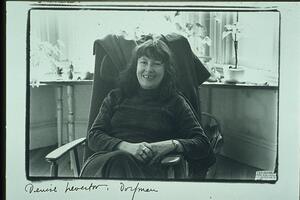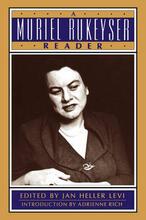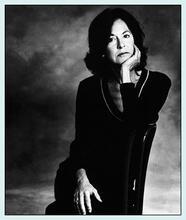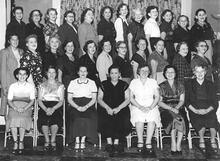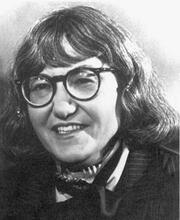Denise Levertov
The author of nineteen books of poetry as well as several books of essays and translations, Denise Levertov was a world-renowned poet. She was also a prominent political activist, particularly in the anti-war and environmental movements. Winner of several prizes, she inspired many younger writers. Although raised as a Christian, she had distinguished Hasidic Jewish ancestors on her father’s side and her husband, Mitchell Goodman, was a Jew by birth, if not by practice.
Early Years, 1923-1948
Priscilla Denise Levertoff was born on October 24, 1923, in Ilford, Essex, England. (She dropped her first name early and changed the spelling of her surname in 1949.) She was the youngest of three daughters born to Beatrice Adelaide Levertoff, neé Spooner-Jones, a Welsh teacher, and the Reverend Paul Philip Levertoff, a Russian Jew who had converted to Christianity and become a priest of the Church of England. Their first child died in infancy, and their second, Olga, born in Leipzig, was nine years older than Denise.
Paul Philip Levertoff’s perceptions of the world derived from the Russian Jewish shtetl of Orsha, Belarus, in which he was raised. His family were originally Sephardic Jews who emigrated from Spain to Russia after the Spanish Inquisition. According to family legend, he was a descendent of the founder of Chabad Hasidism, Rabbi Schneur Zalman, who was said to be his mother’s uncle. As he grew into manhood, his theological studies took him beyond the Pale of Settlement. After he read the New Testament, he became convinced that Jesus was the Messiah and tried to reconcile the two faiths, considering himself a Jewish-Christian.
Denise’s mother grew up in South Wales, the daughter of a physician and his wife, and regarded the mystic, Angell Jones of Mold, a tailor, teacher, and preacher, as an ancestor. Levertov claimed having “Illustrious Ancestors” on both sides of her family. Beatrice’s parents died when she was a child, but with her teachers’ encouragement, she earned a teaching certificate and taught in Constantinople. There she met Paul, who had come for a lecture series. They were married in England in 1911 and lived in Poland and Germany during World War One, after which they returned to Wales and England.
When Hitler became chancellor in 1933, Olga engaged in anti-Fascist activities, though she lived in England. While Denise was still too young to understand the rise of Nazism, she sensed that the atmosphere had changed. Denise’s desire to become a poet preceded World War Two, but the template of her life as a poet was being formed in a dark period of history. She marked this new awareness of otherness in the 1930s as the hallmark of maturity. She saw responsibility for the other as a fundamental structure of subjectivity and moral life, a viewpoint she expressed in her 1967 essay “The Poet in the World.”
Because of the war, Denise’s early adulthood was fraught with contradictions. Her first book of poems, The Double Image (1946), was divided thematically into two sections: “Fears” and “Promises.” In the autumn of 1940, the intensive bombing of London turned much of the city into a wasteland. Denise joined the Civil Nursing Reserve, after which she transferred to a nurse training program and served as an assistant nurse in several hospitals in the London area until the war ended.
In London just after the war, Denise had a love affair with Norman Potter, a designer and poet, with whom she became pregnant. By then she had decided to go to Holland, where she had a job as an au pair with a Dutch family. In March 1947, she had an abortion in the Hague. She then travelled to Paris, where she found a nursing job. While travelling to Switzerland, she met the American writer Mitchell Goodman; they married on December 2, 1947, in England. After travelling in Europe and living with her parents, Denise and Mitch arrived in New York City in October 1948.
A Poet in America, 1949-1966
Upon arriving in New York, Denise and Mitch lived in Greenwich Village, the center of bohemian life after the war. Their son, Nikolai, was born on June 11, 1949. She wrote several poems on aspects of childbirth and parenthood, informed not only by the experience of birth but also by memories associated with her abortion and its aftermath. In an effort to absorb American culture, Denise also befriended young poets in the United States, who helped her to learn American speech patterns. Among these were Robert Creeley and Robert Duncan.
In order to live cheaply and be closer to Denise’s parents, Denise and Mitch rented a cottage in southern France, where they lived from the end of 1950 to the summer of 1951, near Creeley and his family. With the poems of William Carlos Williams as a guide, Creeley helped her to write her first American poems. We see a consolidation of style in her first two American books, Here and Now (1956) and Overland to the Islands (1958). In August 1951, Denise and Mitch moved to Sori, Italy. Shortly after the couple’s return to New York in 1952, they visited Williams, who became a mentor.
Denise’s postwar life in New York City was also marked by loss and marital tension, exacerbated by money worries and Mitch’s relative lack of professional accomplishment. When her father died in 1954 and her mother came to live with her and Mitch, these tensions increased. To accommodate their new situation, the family moved to Mexico for two years in the mid-1950s. In With Eyes at the Back of Our Heads (1960), a newly conceived relation to tradition informed by Mexican culture governs the structure. During her father’s illness, Denise had read Martin Buber’s Tales of the Hasidim, and she drew upon Buber in several poems in which she allies her poetics with her Jewish religious heritage, even though she considered herself a Christian.
Denise returned to New York with Mitch and Nikolai in the winter of 1958, having left Beatrice behind with a Mexican family with whom they were friends. For the next few years, her life would be enriched by increased literary activity, during which she positioned herself in relation to various literary groups and made new friends, including Adrienne Rich and Muriel Rukeyser. She also continued to benefit from reconnection with her European roots, including those that were Jewish, as shown in The Jacob’s Ladder (1961), which included “During the Eichmann Trial,” her first political poem.
Denise turned inward in response to losses, the most grievous of which was the untimely death of her sister, Olga, on March 31, 1964. In the process of mourning, within an atmosphere of increasing political unrest, Denise would come to see herself not only as the recipient of a poetic gift, but also as a participant in the social life of her time. In O Taste and See (1964), originally titled “Grief and Dreams,” the titular grief refers to the knowledge of Olga’s deathly cancer, among other losses. After Olga’s death, mourning the trials of an individual life transformed into witnessing the moral disasters of an era. Denise made the “Olga Poems” the core of her 1967 book, The Sorrow Dance, and reprinted them in To Stay Alive (1971). She came to view her identification with her sister, who had been a political activist in England, as instrumental in her commitment to the New Left.
Life at War, 1966-1974
Denise and Mitch were active in the protest movement against the war in Vietnam, reflected in Denise’s poem “Life at War.” As her reputation grew, Levertov was increasingly in demand as a lecturer and teacher. During the 1966-1967 academic year, she taught at Vassar, and in 1969 both she and Mitch taught at Berkeley, where Denise befriended some of her students, as is evident in her poem “Relearning the Alphabet.” Some of the imagery in this poem was likely inspired by working with her students to support the battle for People’s Park on campus. In the fall of 1969, Denise joined the faculty at MIT, where she participated in a variety of political activities with her students. She paid tribute to them in her poem “A New Year’s Garland for my Students/MIT 1969-70,” and some appear in her poem “Staying Alive.”
In November 1972, Denise traveled to Hanoi with Muriel
Rukeyser. She expressed some of her impressions of Vietnam in such poems as “In Thai Binh (Peace) Province.” The bombing of Vietnam also led Denise to sever ties with poets she had considered friends, among them Robert Duncan, whose gnostic, anarchist beliefs led him to disengage from political action. This did not affect her literary standing. In 1973, she was hired to teach at Tufts University, where she became a tenured professor.
As their marriage continued to deteriorate, Denise became attracted to younger men, one of whom, Richard Edelman, appears unnamed in several poems in Footprints (1972) and The Freeing of the Dust (1975). Her marriage to Mitch ended and by 1975, they were divorced. She wrote about this process in such poems as “Divorcing.”
A New Life, 1975-1988
Beginning again as a single woman was both exhilarating and dejecting. Denise had several failed romances. Her political activism continued, but she became more despairing about the fate of the earth. As her mother’s health began to fail and her son became estranged after he and his girlfriend quarreled with her, Denise’s losses increased, as did her attempts to compensate. The titles of the two books Denise published in this period, Life in the Forest (1978) and Candles in Babylon (1982), reflect her sense of being lost in the dark and burning. She continued to strive for justice and mercy, becoming the poetry editor of Mother Jones and active in the antinuclear movement. She also visited her mother in Mexico. In 1977, her mother fell and died shortly after, on June 8, 1977. Life in the Forest contains eight poems about Beatrice Levertoff’s old age and death. Denise’s distress was exacerbated when her relations with her son became further strained. She also resigned from Tufts in 1979 after the English Department hired someone she disapproved of.
Levertov’s political activities helped her to recover from her losses, but ultimately consolation came in a religious context, as she began to attend church services regularly. A choral recital inspired her poem “Mass for the Day of St. Thomas Didymus,” which expressed her turn toward religious faith. However, she opposed increased U.S. involvement in the civil war in El Salvador and despaired of the ongoing nuclear threat. These sources of unrest contributed to the prevailing mood of uncertainty and longing in Oblique Prayers (1984). By 1986, stimulated by liberation theology, Denise experienced a new fellowship with those branches of the church that had increased their activity in the peace and justice movements. She began teaching at Stanford University in 1982 and continued to teach there until 1994. When Breathing the Water (1987) was published, Levertov had achieved a degree of inner peace. Her poems about the mystic Julian of Norwich, mark another revolution in Denise’s spiritual development.
Late Years, 1989-1997
In her sixties, Denise began to feel intimations of mortality, heightened by her deteriorating health. She drew upon spiritual resources to help, evident in A Door in the Hive (1989). She also continued to explore questions of religious faith, a process strengthened by her conversion to Roman Catholicism in 1990, shortly after her move to Seattle. Formal reception into a new faith and resettlement in the Pacific Northwest, a climate reminiscent of England, were part of a return to the past evident in Evening Train (1992). She continued to write and travel in the last five years of her life and sought an increasingly structured devotional life, practicing the Spiritual Exercises of Saint Ignatius of Loyola after her diagnosis of lymphoma in 1993. While uncertainty and threat govern the mood of the opening poems of Sands of the Well (1996), its emotional curve reaches toward “primary wonder” as she seeks a deeper clarity based on the acceptance of mystery. She also wrote the autobiographical prose pieces collected in Tesserae: Memories and Suppositions (1995).
Denise Levertov died on December 20, 1997, with her son Nikolai, with whom she had reconciled in 1994, and several friends at her hospital bedside.
Selected Works
Collected Poems. Edited and Annotated by Paul A. Lacey and Anne Dewey. New York: New Directions, 2013.
Tesserae: Memories and Suppositions. New York: New Directions, 1995.
New and Selected Essays. New York: New Directions, 1992.
The Poet in the World. New York: New Directions, 1973.
Bertholf, Robert J. and Albert Gelpi, eds. The Letters of Robert Duncan and Denise Levertov. Stanford: Stanford University Press, 2004.
Bertholf, Robert J. and Albert Gelpi, eds. The Poetry of Politics, the Politics of Poetry. Stanford: Stanford University Press, 2006.
Brooker, Jewel Spears, ed. Conversations with Denise Levertov. Jackson, MS: University Press of Mississippi, 1998.
Hollenberg, Donna Krolik. A Poet’s Revolution: The Life of Denise Levertov. Berkeley: University of California Press, 2013.
MacGowan, Christopher, ed. The Letters of Denise Levertov and William Carlos Williams. New York: New Directions, 1998.
Wagner-Martin, Linda, ed. Critical Essays on Denise Levertov. New York: G.K. Hall & Co., 1991.

